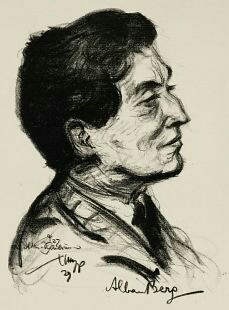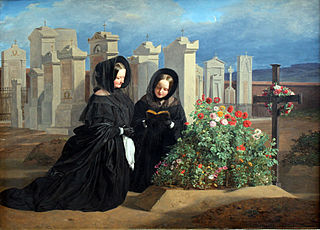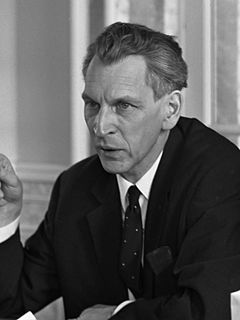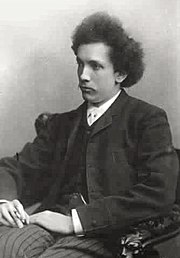The Gramophone Classical Music Awards, launched in 1977, are one of the most significant honours bestowed on recordings in the classical record industry. They are often viewed as equivalent to or surpassing the American Grammy award, and referred to as the Oscars for classical music. They are widely regarded as the most influential and prestigious classical music awards in the world. According to Matthew Owen, national sales manager for Harmonia Mundi USA, "ultimately it is the classical award, especially worldwide."

John Nicholas Maw was a British composer. Among his works are the operas The Rising of the Moon (1970) and Sophie's Choice (2002).

The Seven Early Songs, are early compositions of Alban Berg, written while he was under the tutelage of Arnold Schoenberg. They are an interesting synthesis combining Berg's heritage of pre-Schoenberg song writing with the rigour and undeniable influence of Schoenberg. The writing very much carries with it the heritage of Richard Strauss, through the expansiveness of gesture and 'opening of new vistas,' and that of Richard Wagner. The songs were first written for a medium voice and piano; the composer himself revised them in 1928 for high voice and orchestra.

Ein Heldenleben, Op. 40, is a tone poem by Richard Strauss. The work was completed in 1898. It was his eighth work in the genre, and exceeded any of its predecessors in its orchestral demands. Generally agreed to be autobiographical in nature despite contradictory statements on the matter by the composer, the work contains more than thirty quotations from Strauss's earlier works, including Also sprach Zarathustra, Till Eulenspiegel, Don Quixote, Don Juan, and Death and Transfiguration.
The Four Last Songs, Op. posth., for soprano and orchestra are – with the exception of the song "Malven" (Mallows), composed later the same year – the final completed works of Richard Strauss. They were composed in 1948 when the composer was 84.
Howard Ferguson was an Irish composer and musicologist from Belfast. He composed instrumental, chamber, orchestral and choral works. While his music is not widely known today, his Piano Sonata in F minor, Op. 8 and his Five Bagatelles, Op. 9, for piano are still performed. His works represent some of the most important 20th-century music to emerge from Northern Ireland.

"Cäcilie", Op. 27 No. 2, is the second in a set of four songs composed by Richard Strauss in 1894.

"Ruhe, meine Seele!", Op. 27, No. 1, is the first in a set of four songs composed by Richard Strauss in 1894. It was originally for voice and piano, and not orchestrated by Strauss until 1948, after he had completed one of his Four Last Songs, "Im Abendrot". The words are from a poem "Ruhe, meine Seele!" written by the poet Karl Henckell.

Janet Maguire was an American composer born in Chicago, resided in Venice, Italy.

"Heimliche Aufforderung", Op. 27 No. 3, is one of a set of four songs composed by Richard Strauss in 1894. It was originally for voice and piano, but it was orchestrated in 1929 by the German conductor Robert Heger. The text is from a poem in German by John Henry Mackay.
Carmen Petra Basacopol is a Romanian composer and music teacher.
In 1882–3 Richard Strauss wrote his Horn Concerto No. 1 in E-flat major, Op. 11, in two versions, one for piano accompaniment and one with an orchestra. The horn concerto has become the most frequently performed horn concerto written in the 19th century.The premiere with piano accompaniment was given in 1883 at Munich. The premiere with orchestral accompaniment in 1885 at Meiningen. Strauss later wrote a second horn concerto in 1942, towards the end of his life.

"Zueignung" is a Lied composed by Richard Strauss in 1885, setting a poem by the Austrian poet Hermann von Gilm. It was included in Strauss's first published collection of songs, as Op. 10 in 1885. Originally scored for voice and piano, the song was orchestrated in 1932 by the German conductor Robert Heger and in 1940 by Strauss himself. It is one of the composer's best-known songs.

"Allerseelen" is an art song for voice and piano composed by Richard Strauss in 1885, setting a poem by the Austrian poet Hermann von Gilm from his collection Letzte Blätter. It is the last in a collection of eight songs which were all settings of Gilm poems from the same volume entitled Acht Lieder aus Letzte Blätter, the first collection of songs Strauss ever published as Op. 10 in 1885, including also "Zueignung" (Dedication) and "Die Nacht". The song was orchestrated in 1932 by German conductor Robert Heger.

"Befreit" is an art song for voice and piano composed by Richard Strauss in 1898, setting a poem by the German poet Richard Dehmel. The song is part of the collection Fünf Lieder für hohe Singstimme mit Pianofortebegleitung. Strauss orchestrated the song in 1933.

"Der Arbeitsmann" is an art song for voice and piano composed by Richard Strauss in 1889, setting a poem by the German poet Richard Dehmel. The song is part of the collection Fünf Lieder für hohe Singstimme mit Pianofortebegleitung. Strauss orchestrated the song in 1918.

Charles Clement Fussell is an American composer and conductor of contemporary classical music. He has composed six symphonies and three operas. His symphony Wilde for solo baritone and orchestra, based on the life of Oscar Wilde and premiered by the Newton Symphony Orchestra and the baritone Sanford Sylvan in 1990, was a finalist for the 1991 Pulitzer Prize for Music. He received a citation and award from the American Academy of Arts and Letters in 1992.

"Ständchen" ("Serenade") is an art song composed by Richard Strauss in 1886, setting a poem of the same title by the German poet Adolf Friedrich von Schack. It is the second song in his collection Six songs for high voice and piano, Op. 17, TrV 149, which were all settings of Schack poems. The song is written for voice and piano.

Taillefer, Op. 52, TrV 207, is a cantata for choir and orchestra composed by Richard Strauss in 1903. The text is a rendering of the medieval tale Taillefer by the German poet Ludwig Uhland (1787–1862). The piece was written to celebrate the centenary of Heidelberg University and was premiered on the same day that Strauss received his honorary doctorate from the university, on 26 October 1903 in the newly built Heidelberg Town Hall with Strauss conducting. It is written for a mixed chorus with three soloists, tenor (Taillefer), baritone, and soprano, with a large orchestra. The work was performed at the last night of The Proms in 2014.

Marius Flothuis, born and died in Amsterdam, was a Dutch composer, musicologist and music critic.















